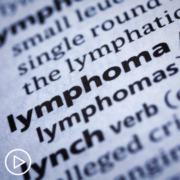What Are the Symptoms of Renal Medullary Carcinoma?
What Are the Symptoms of Renal Medullary Carcinoma? from Patient Empowerment Network on Vimeo.
What renal medullary carcinoma (RMC) symptoms do high-risk patients need to be aware of? Respected expert Dr. Nizar Tannir shares common symptoms that can signal RMC and advice for patients to help ensure they receive urgent care when needed.
Dr. Nizar Tannir is a Professor in the Department of Genitourinary Medical Oncology, Division of Cancer Medicine at The University of Texas MD Anderson Cancer Center.
[ACT]IVATION TIP
“…if an individual who has sickle cell trait sees blood in the urine or they have flank pain, that those are warning signs, they need to seek medical attention, they need to contact their physician or go to a local emergency room or healthcare facility, and be checked. They can start with having an ultrasound or a CAT scan to really evaluate the kidneys, to look at the kidneys.”
Download Guide | Descargar Guía
Related Resources:

What Are the Challenges of Diagnosing Renal Medullary Carcinoma? |
Transcript:
Cora:
For those who may be considered high-risk, what are the symptoms of renal medullary carcinoma?
Dr. Tannir:
RMC, is the most aggressive type of kidney cancer so as any kidney cancer, the symptoms relate to the tumor in the kidney, so there will be blood in the urine, that’s one symptom another symptom is pain, flank pain or abdominal pain, belly pain, those are the symptoms related to the, these are local symptoms related the finding of the tumor in the kidney, but if there is a spread of the cancer and RMC, the reason it is one of the most aggressive cancers any person can get, and the most aggressive kidney cancer type is because of its propensity to spread to organs, and, of course, if there is a spread of the cancer or RMC to organs, there will be symptoms related to the spread of the cancer to these organs, for example, if they cancer spread to the lungs, the patient or the subject, we have cough or shortness of breath, or chest pain, if it spreads to bone they have bone pain, they may have weight loss and fever, and these are called constitutional symptoms.
So fatigue, so these are symptoms related to advanced cancer as it is with any advanced cancer, but specific local symptoms related to RMC would be flank pain and or blood in the urine. These should be warning signs. So my activation tip is if an individual who has sickle cell trait sees blood in the urine or they have flank pain, that those are warning signs, they need to seek medical attention, they need to contact their physician or go to a local emergency room or healthcare facility, and be checked. They can start with having an ultrasound or a CAT scan to really evaluate the kidneys, to look at the kidneys. So this is an important activation tip for individuals who see, who experience or encounter any of those symptoms I just mentioned.








